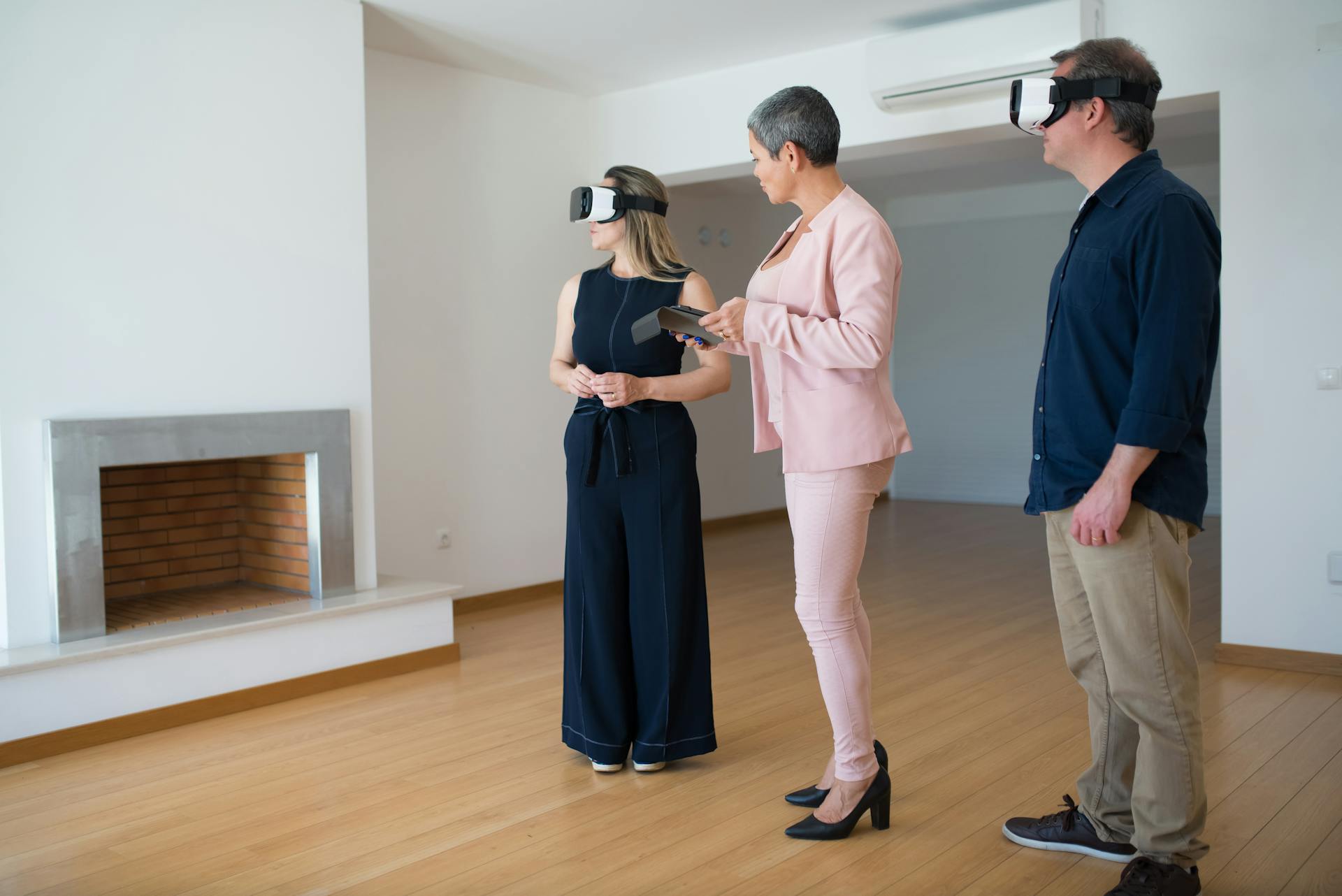PROPERTYSPARK ARTICLE
The Rise Of Virtual Reality In Real Estate: Transforming Property Viewings And Marketing Strategies
Virtual Reality or VR technology has risen as a game-changer in many fields, including the real estate industry. It has revolutionized the way real estate brokers market and sell their properties. In this article, we will explore the profound impact of VR on property sales, challenges highlighting its benefits, and future prospects. Real estate entrepreneurs are increasingly using VR to improve customer engagement. They also leverage this technology to streamline the sales process, resulting in a more efficient and immersive property buying experience.

The Growing Landscape of Real Estate Marketing
This Traditionally, real estate marketing relies mainly on floor plans, descriptive texts, and static images to deliver the essence of property. However, the limitations of these traditional methods brought about a quest for more engaging and dynamic alternatives. That is where virtual reality enters, being a game-changer. It goes beyond the boundaries of traditional marketing, providing a virtual walkthrough experience that gives properties a life.
As the demand for immersive experiences is increasing, real estate professionals are encouraging VR technology. It allows them to display properties more realistically and interactively. This transformation is not only a trend but a major evolution in the way properties are perceived.
Virtual Reality and Remote Property Viewing
The whole world has gone through significant changes. These changes including social distancing and travel restrictions have become the new normal. In such scenarios, VR emerges as a robust tool. It allows remote property viewing with no need for any physical presence.
Brian Bosscher, owner and founder of Condo Control, said, “Prospective customers, regardless of their geographical location, can have a virtual tour of properties from the comfort of their homes. This helps in the decision-making process and also extends the potential buyers pool. It is so because you can cater to individuals not having the means to visit properties in person.
Real estate experts can lead virtual open houses, delivering an interactive and personalized experience for potential clients. This will improve the efficiency of property transactions and align with the growing expectations of any tech-savvy buyer. “
Benefits of VR in Real Estate Sales and Marketing
We have briefly mentioned how VR can be beneficial for real estate marketing. Here are some other benefits that real estate professionals can attain through VR in marketing.
Improved Property Tours
The days of physical property tours are gone where there are time-consuming visits and multiple locations. With virtual reality, you can allow potential clients to explore properties from their comfort. Using VR headsets or just a smartphone, users can take captivating virtual tours. They can experience every little detail of a property as if they are physically present there. VR maximizes transparency and minimizes the need for in-person visits. It includes the visualization of the layout and floor plans and also examining details like fixtures, views, and finishes.
Overcoming Time Constraints and Distance
One of the major benefits of VR in real estate is its ability to overcome any geographical barriers. Using VR, potential buyers can visualize and experience properties located in different states, cities, or even countries without the need of travelling.
This technology is a game-changer for international clients or the ones seeking to relocate. VR allows investors to make informed decisions remotely, saving expenses, time, and logistical challenges. For agents and sellers, VR extends their potential buyer pool, reaching a wider audience than ever before.
Personal and Emotional Connection
Alex Begum, San Antonio Injury Lawyer at VB Law Group, said, “A significant aspect of real estate is the emotional connection that clients establish with properties. VR allows agents to develop highly engaging experiences that give rise to emotional responses. Incorporating virtual interior design and staging helps potential buyers visualize how a property could look along with their personal touch.”
It may be a family picturing themselves gathered around the living area or a business professional imagining their dream office space. VR taps into these details and emotional aspects of renting or buying a property. This can also result in deeper engagement and faster decision-making.
Time Efficiency and Cost-Effectiveness
In addition to eliminating the travel expenses for clients, VR in real estate also provides cost-saving benefits for agents and sellers. Through virtual reality, there can be an efficient showcasing of many properties within a short amount of time. It will also eliminate the need for physical staging and preparation of every location individually.
Eran Mizrahi, CEO of Ingredient Brothers, said, “This cost-efficiency is specifically beneficial for new properties and developments still under construction where it is not possible for traditional staging. Moreover, VR-powered marketing campaigns reach an extensive audience, engaging more potential buyers. It will ultimately shorten the sales cycle.”
Design Improvements and Collaboration
Virtual reality is not just limited to property tours alone. It also makes collaboration possible among developers, clients, and architects during the pre-construction and design phases. Using VR, buyers can visualize and make well-informed decisions. These are about finishes, layout, and overall aesthetics of a property before even the construction begins. It makes sure that all parties are aligned, minimizing the risk of costly modifications and design changes during the construction process.
Data Analytics
Virtual reality platforms can offer valuable insights into user behavior. Real estate brokers can monitor which parts of a property establish the most interest. It can help them to tailor their property presentations and marketing efforts to match buyer preferences.
Challenges and Consideration of VR in Real Estate
Vicky Cano, Chef & Recipe developer at mealfan, said, “Although VR provides several benefits, it also includes challenges for real estate agents. One of the main challenges is the high cost associated with developing high-quality VR content. In addition, there are considerations about the accessibility of VR technology. This is so because not all potential buyers may have VR headsets or devices. Real estate entrepreneurs need to consider these challenges and weigh them against their advantages in their marketing strategies.”
Cost of Implementation
A primary challenge that real estate entrepreneurs face in adopting VR is the initial costs required for implementation. Generating high-quality VR content, including 3D rendering, modelling, and virtual tour development can be expensive. According to an estimation, the investment to create a basic VR tour for a single property can range between $3,000 to $5,000. It can depend on multiple factors, including the quality and complexity of the content.
User Experience and Content Quality
Another challenge to implementing VR technology in real estate is ensuring the overall user experience and the quality of the content. A laggy or poorly designed VR tours, low-resolution content can reduce engagement and may even discourage potential clients from exploring more.
Integration with Existing Systems
Martin Seeley, CEO of Mattress Next DayMattress Next Day, said, “Integrating VR technology with the present real estate systems and workflows can be complicated. Real estate entrepreneurs need to make sure that their VR solutions smoothly integrate with their existing CRM systems, marketing platforms, and property databases. It will help them to maximize effectiveness and efficiency. “
Training and Support
It can be a real challenge to train and support clients and agents on how to use VR technology effectively. Providing proper training and continuous support can help overcome this problem. Furthermore, it can ensure that both clients and agents are comfortable using VR for property sales and viewing. Since VR is still a new technology, finding adequate training and support can also be a challenge to consider. Plus, it can be a costly option for entrepreneurs because of the high demand and low accessibility.
Conclusion
In the future, as VR technology becomes more accessible and affordable, we expect to see its adoption widespread. It can be spread beyond high-end properties to more ordinary markets. This will modify the property buying process. It will become more accessible and inclusive to a wide range of customers. The future of VR in real estate seems full of innovation and bright. Entrepreneurs embracing this technology early on can gain a competitive benefit. It is so because they can provide buyers with a more engaging and immersive property buying experience.
Learn how to Become a Top Agent with the Guaranteed 5 Min/Week System
No social media experience needed
Free webinar seat (limited quantities)
Learn the guaranteed 5 min/week system
Become a social media superstar
Constantly get new leads
Beat the competition
Get a special webinar deal
This Agent Tripled His Commissions Just With Social Media
Learn how this real estate agent tripled his commissions just with social media and how you too can become a social media superstar.
Why You Can’t Just “Boost” Your Real Estate Listing
That big blue button has tempted you before right? You want to Facebook Boost your Real Estate listing. Find out why you shouldn’t!
How Much Should Realtors Spend On Social Media
A question we get often from Realtors is “how much should I spend on social media?” Find out exactly how much to spend and how to spend it without getting ripped off!



